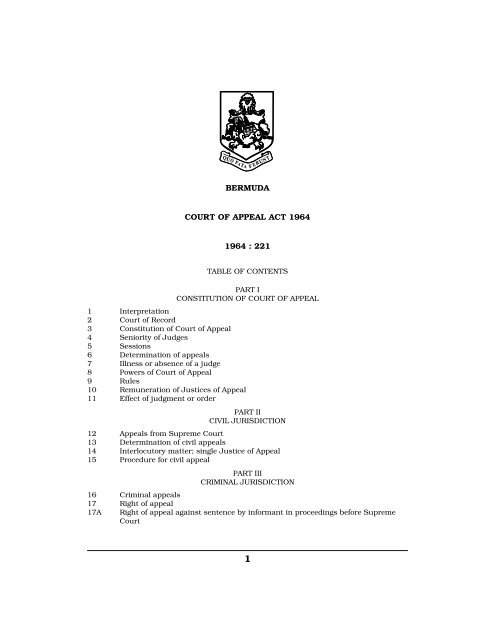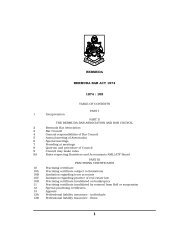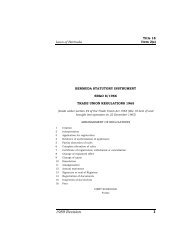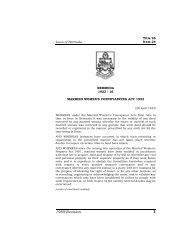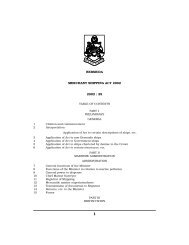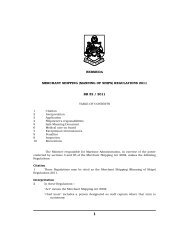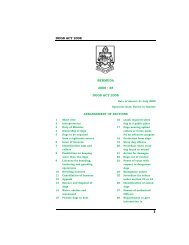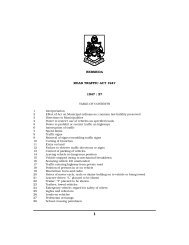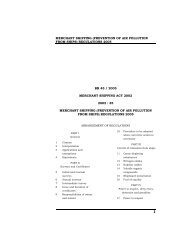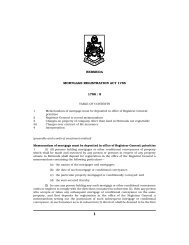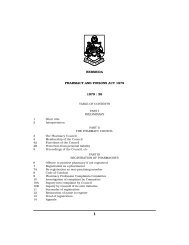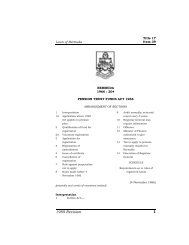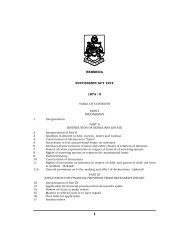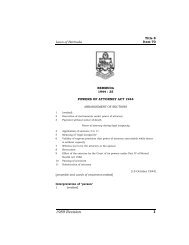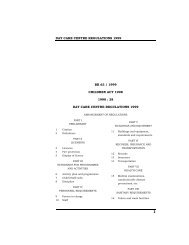Court of Appeal Act 1964 - Bermuda Laws Online
Court of Appeal Act 1964 - Bermuda Laws Online
Court of Appeal Act 1964 - Bermuda Laws Online
You also want an ePaper? Increase the reach of your titles
YUMPU automatically turns print PDFs into web optimized ePapers that Google loves.
QUOFAT AFUE RNTBERMUDACOURT OF APPEAL ACT <strong>1964</strong><strong>1964</strong> : 221TABLE OF CONTENTS123456789101112131415161717APART ICONSTITUTION OF COURT OF APPEALInterpretation<strong>Court</strong> <strong>of</strong> RecordConstitution <strong>of</strong> <strong>Court</strong> <strong>of</strong> <strong>Appeal</strong>Seniority <strong>of</strong> JudgesSessionsDetermination <strong>of</strong> appealsIllness or absence <strong>of</strong> a judgePowers <strong>of</strong> <strong>Court</strong> <strong>of</strong> <strong>Appeal</strong>RulesRemuneration <strong>of</strong> Justices <strong>of</strong> <strong>Appeal</strong>Effect <strong>of</strong> judgment or orderPART IICIVIL JURISDICTION<strong>Appeal</strong>s from Supreme <strong>Court</strong>Determination <strong>of</strong> civil appealsInterlocutory matter; single Justice <strong>of</strong> <strong>Appeal</strong>Procedure for civil appealPART IIICRIMINAL JURISDICTIONCriminal appealsRight <strong>of</strong> appealRight <strong>of</strong> appeal against sentence by informant in proceedings before Supreme<strong>Court</strong>1
COURT OF APPEAL ACT <strong>1964</strong>17B18192021222323A23B24252627282930313233<strong>Appeal</strong> by DPP where accused acquitted or discharged <strong>of</strong> murderProcedure for criminal appealPowers which may be exercised by a Justice <strong>of</strong> <strong>Appeal</strong>Effect <strong>of</strong> giving notice <strong>of</strong> appealDetermination <strong>of</strong> appeals by convicted personsPowers <strong>of</strong> <strong>Court</strong> <strong>of</strong> <strong>Appeal</strong> in special casesDetermination <strong>of</strong> appeals under section 17(2)Determination <strong>of</strong> appeal under section 17A in respect <strong>of</strong> sentenceDetermination <strong>of</strong> appeal under section 17BDetermination <strong>of</strong> appeals under section 17(3)Right <strong>of</strong> appellant to be presentLegal assistance to appellantGovernor may refer case to <strong>Court</strong> <strong>of</strong> <strong>Appeal</strong>PART IVSUPPLEMENTALRegistrar <strong>of</strong> <strong>Court</strong> <strong>of</strong> <strong>Appeal</strong>Sentence <strong>of</strong> death or corporal punishment; waiting period [repealed]Saving for Royal Prerogative <strong>of</strong> mercyAmendments [omitted]Repeals [omitted]Commencement and application [omitted]SCHEDULE[preamble and words <strong>of</strong> enactment omitted]PART ICONSTITUTION OF COURT OF APPEALInterpretation1 In this <strong>Act</strong>, unless the context otherwise requires—“appeal” means an appeal from the Supreme <strong>Court</strong> to the <strong>Court</strong> <strong>of</strong> <strong>Appeal</strong>;“application for habeas corpus” means an application for a writ <strong>of</strong> habeas corpusad subjiciendum;“<strong>Court</strong> <strong>of</strong> <strong>Appeal</strong>” means the <strong>Court</strong> <strong>of</strong> <strong>Appeal</strong> for <strong>Bermuda</strong>;“informant” means the person who has laid the information in a prosecution beforea court <strong>of</strong> summary jurisdiction;“judgment”, in relation to a civil appeal, includes any decree, order or decision; and,in relation to a criminal appeal, includes a conviction, sentence, order ordecision;2
COURT OF APPEAL ACT <strong>1964</strong>“person aggrieved by a judgment” shall be deemed to include the Attorney-Generalor the Director <strong>of</strong> Public Prosecutions on behalf <strong>of</strong> the Crown in a civil orcriminal matter, and an informant ;“prescribed” means prescribed by this <strong>Act</strong> or by any Rules made thereunder;“the President” means the person appointed to be the President <strong>of</strong> the <strong>Court</strong> <strong>of</strong><strong>Appeal</strong>;“Rules” means Rules made under section 9.[Section 1 “person aggrieved” amended by 1999:8 s.3 & Sch 2 effective 1 April 1999]<strong>Court</strong> <strong>of</strong> Record2 The <strong>Court</strong> <strong>of</strong> <strong>Appeal</strong> shall be a superior <strong>Court</strong> <strong>of</strong> Record.Constitution <strong>of</strong> <strong>Court</strong> <strong>of</strong> <strong>Appeal</strong>3 (1) For the purposes <strong>of</strong> section 77 (2) <strong>of</strong> the Constitution [title 2 item 1] the number<strong>of</strong> Justices <strong>of</strong> <strong>Appeal</strong> shall be not more than six.(2) Subject to section 7, at any sitting the <strong>Court</strong> <strong>of</strong> <strong>Appeal</strong> shall consist <strong>of</strong> thePresident and not less than two other Justices <strong>of</strong> <strong>Appeal</strong>:Provided that, in the absence <strong>of</strong> the President, the senior Justice <strong>of</strong> <strong>Appeal</strong> shallpreside.(3)<strong>of</strong> <strong>Appeal</strong>.A judge <strong>of</strong> the Supreme <strong>Court</strong> may exercise any <strong>of</strong> the powers <strong>of</strong> a single Justice[Section 3 amended by 2000:41 effective 1 June 2001]Seniority <strong>of</strong> Judges4 The seniority <strong>of</strong> the Justices <strong>of</strong> <strong>Appeal</strong> shall be determined in accordance with anyinstructions given from time to time by the Governor acting in his discretion, or asprescribed by Rules.Sessions5 (1) The <strong>Court</strong> <strong>of</strong> <strong>Appeal</strong> shall sit for the hearing <strong>of</strong> appeals at such times as thePresident, in consultation with the Chief Justice, may from time to time appoint.(2) Nothing in this section shall be construed so as to affect the power <strong>of</strong> the <strong>Court</strong><strong>of</strong> <strong>Appeal</strong> to adjourn, postpone or cancel any sitting <strong>of</strong> the <strong>Court</strong> <strong>of</strong> <strong>Appeal</strong> which has beenappointed by the President under this section.Determination <strong>of</strong> appeals6 <strong>Appeal</strong>s shall be decided in accordance with the opinion <strong>of</strong> the majority <strong>of</strong> theJudges composing the <strong>Court</strong> <strong>of</strong> <strong>Appeal</strong>, or, if there is no such majority in relation to thejudgment appealed against or any part there<strong>of</strong>, then the judgment appealed against or thatpart, as the case may be, shall stand.3
COURT OF APPEAL ACT <strong>1964</strong>Illness or absence <strong>of</strong> a judge7 (1) If in the course <strong>of</strong> any appeal, any Judge hearing the appeal is unable throughillness or any other cause to attend the proceedings or otherwise to exercise his functionsas a Judge, the hearing <strong>of</strong> such appeal shall, if the parties thereto consent, continue beforethe remaining Judges hearing the appeal, not being less than two in number, and suchcourt shall, for the purposes <strong>of</strong> such appeal, be deemed to be duly constitutednotwithstanding the absence or inability <strong>of</strong> such Judge, and the appeal may be determinedwithout his decision thereon.(2) If any party to an appeal does not consent as aforesaid, the appeal shall beadjourned to such date as will enable it to be heard de novo before a <strong>Court</strong> <strong>of</strong> <strong>Appeal</strong>constituted in accordance with section 3.Powers <strong>of</strong> <strong>Court</strong> <strong>of</strong> <strong>Appeal</strong>8 (1) Subject to this <strong>Act</strong> and any Rules, in the determination <strong>of</strong> appeals before it, the<strong>Court</strong> <strong>of</strong> <strong>Appeal</strong> shall have all the powers and duties conferred or imposed on the Supreme<strong>Court</strong> in the exercise <strong>of</strong> its original or appellate jurisdiction.(2) The powers <strong>of</strong> the <strong>Court</strong> <strong>of</strong> <strong>Appeal</strong> to admit additional evidence shall correspondto the power <strong>of</strong> the Supreme <strong>Court</strong> to admit fresh evidence in the exercise <strong>of</strong> its appellatejurisdiction in a civil or criminal cause, as the case may be.Rules9 (1) Subject to subsection (2), the President (or any Justice <strong>of</strong> <strong>Appeal</strong> appointed bythe President for the purpose) may make Rules for carrying this <strong>Act</strong> into effect, and, inparticular, but without prejudice to the generality <strong>of</strong> the foregoing, for all or any <strong>of</strong> thefollowing matters, that is to say—(a)(b)(c)(d)(e)(f)for regulating the practice and procedure <strong>of</strong> the <strong>Court</strong> <strong>of</strong> <strong>Appeal</strong>, includingall matters connected with the forms to be used and the fees to be payable;for making provision with respect to the practice and procedure <strong>of</strong> the<strong>Court</strong> <strong>of</strong> <strong>Appeal</strong> in relation to appeals under section 15 <strong>of</strong> the Constitution[title 2 item 1] from the determinations <strong>of</strong> the Supreme <strong>Court</strong> or the <strong>Court</strong><strong>of</strong> <strong>Appeal</strong> and such provision may include provision with respect to thetime within which any appeal shall or may be brought;for regulating the sittings <strong>of</strong> the <strong>Court</strong> <strong>of</strong> <strong>Appeal</strong> for the purpose <strong>of</strong> hearingappeals from the Supreme <strong>Court</strong>;for the form and contents <strong>of</strong> the notice <strong>of</strong> appeal and <strong>of</strong> any reply (if any)which may be made thereto;for the time within which any appeal and any document relating to theappeal may be lodged, for the extension <strong>of</strong> such time and the conditionsupon which such extension may be allowed;for the consequences which may follow upon the failure <strong>of</strong> any party tocomply with any <strong>of</strong> the Rules <strong>of</strong> <strong>Court</strong>, as to time or otherwise;4
COURT OF APPEAL ACT <strong>1964</strong>(g)(h)(i)(j)for the stay <strong>of</strong> execution pending the determination <strong>of</strong> an appeal and theconditions, as to security or otherwise, which may be imposed in any orderstayingfor the abandonment <strong>of</strong> an appeal and for the circumstances in which anappeal shall be deemed to have been abandoned;for regulating the fees payable to barristers and attorneys engaged in anappeal at the instance <strong>of</strong> the <strong>Court</strong> <strong>of</strong> <strong>Appeal</strong>, and the fees payable towitnesses;for the scales <strong>of</strong> costs and the taxation <strong>of</strong> costs.(2) Section 6 <strong>of</strong> the Statutory Instruments <strong>Act</strong> 1977 [title 1 item 3] shall not applyto any rules made under this section.Remuneration <strong>of</strong> Justices <strong>of</strong> <strong>Appeal</strong>10 The President and Justices <strong>of</strong> <strong>Appeal</strong> shall be entitled to receive out <strong>of</strong> the fundsappropriated by the Legislature for the purpose such sums as the Governor may determinein respect <strong>of</strong>—(a)(b)(c)(d)(e)a retaining fee and fees for sitting as a member <strong>of</strong> the <strong>Court</strong> <strong>of</strong> <strong>Appeal</strong>;fees for work preparatory to the hearing <strong>of</strong> an appeal;fees for the preparation or drafting <strong>of</strong> a judgment;out <strong>of</strong> pocket expenses for board and accommodation while in <strong>Bermuda</strong> asa member <strong>of</strong> the <strong>Court</strong> <strong>of</strong> <strong>Appeal</strong>;travelling expenses to and from <strong>Bermuda</strong>:(i)(ii)Provided that—this section shall not apply to any person who is the holder <strong>of</strong> apensionable <strong>of</strong>fice in and ordinarily resident in <strong>Bermuda</strong>; andany person who is ordinarily resident in <strong>Bermuda</strong> shall not be entitledto receive any <strong>of</strong> the expenses specified in paragraphs (d) or (e) <strong>of</strong> thissection.Effect <strong>of</strong> judgment or order11 Any judgment or other order given or made by the <strong>Court</strong> <strong>of</strong> <strong>Appeal</strong> shall have thefull force and effect <strong>of</strong> a judgment or order given or made by the Supreme <strong>Court</strong>.5
COURT OF APPEAL ACT <strong>1964</strong>PART IICIVIL JURISDICTION<strong>Appeal</strong>s from Supreme <strong>Court</strong>12 (1) Subject to subsections (2) and (3) and any Rules, any person aggrieved by ajudgment <strong>of</strong> the Supreme <strong>Court</strong> in any civil cause or matter, (including matrimonial causes),whether final or interlocutory, or whether in its original or appellate jurisdiction, may appealto the <strong>Court</strong> <strong>of</strong> <strong>Appeal</strong>; and any such appeal is hereinafter referred to as a “civil appeal”.(2)No appeal shall lie to the <strong>Court</strong> <strong>of</strong> appeal—(a)(b)against the decision in respect <strong>of</strong> any interlocutory matter; oragainst an order for costs,except with leave <strong>of</strong> the Supreme <strong>Court</strong> or <strong>of</strong> the <strong>Court</strong> <strong>of</strong> <strong>Appeal</strong>.(3) In respect <strong>of</strong> matrimonial causes, no appeal shall lie from a decree absolute forthe dissolution or nullity <strong>of</strong> marriage where the person against whom such decree is madehas had the time and opportunity to appeal from the decree nisi prior to its being madeabsolute and has not appealed from the decree nisi.Determination <strong>of</strong> civil appeals13 Upon the hearing <strong>of</strong> a civil appeal the <strong>Court</strong> may allow the appeal in whole or inpart or may dismiss the appeal in whole or in part or may remit the case to the Supreme<strong>Court</strong> to be retried in whole or in part and may make such other order as the <strong>Court</strong> mayconsider just.Interlocutory matter; single Justice <strong>of</strong> <strong>Appeal</strong>14 To the extent prescribed by Rules the powers <strong>of</strong> the <strong>Court</strong> <strong>of</strong> <strong>Appeal</strong> to hear anddetermine any interlocutory matter may be exercised by any Justice <strong>of</strong> <strong>Appeal</strong> in the samemanner as they may be exercised by the <strong>Court</strong> <strong>of</strong> <strong>Appeal</strong> and subject to the same provisions:Provided that every order made by a Justice <strong>of</strong> <strong>Appeal</strong> in pursuance <strong>of</strong> this sectionmay, on application by the aggrieved party and subject to any Rules, be discharged or variedby the <strong>Court</strong> <strong>of</strong> <strong>Appeal</strong>.Procedure for civil appeal15 Subject to any Rules, all civil appeals shall be by way <strong>of</strong> re-hearing and no writ <strong>of</strong>error or other formal proceeding other than as may be required by this <strong>Act</strong> or Rules shallbe necessary.6
COURT OF APPEAL ACT <strong>1964</strong>PART IIICRIMINAL JURISDICTIONCriminal appeals16 Subject to section 17 and any Rules, any person aggrieved by a judgment <strong>of</strong> theSupreme <strong>Court</strong> in any criminal proceeding, whether in its original or appellate jurisdiction,may appeal to the <strong>Court</strong> <strong>of</strong> <strong>Appeal</strong>; and any such appeal is hereinafter referred to as a“criminal appeal”,Right <strong>of</strong> appeal17 (1) A person convicted on indictment, or a person convicted by a court <strong>of</strong> summaryjurisdiction and whose appeal to the Supreme <strong>Court</strong> under the Criminal <strong>Appeal</strong> <strong>Act</strong> 1952,has not been allowed, may appeal to the <strong>Court</strong> <strong>of</strong> <strong>Appeal</strong>—(2)(a)(b)(c)(d)against his conviction in the Supreme <strong>Court</strong>, or in any other case, againstthe decision <strong>of</strong> the Supreme <strong>Court</strong>, upon any ground <strong>of</strong> appeal involving aquestion <strong>of</strong> law alone; andwith the leave <strong>of</strong> the <strong>Court</strong> <strong>of</strong> <strong>Appeal</strong> or upon the certificate <strong>of</strong> the Supreme<strong>Court</strong> that it is a fit case for appeal against conviction, upon any ground <strong>of</strong>appeal which involves a question <strong>of</strong> fact alone, or a question <strong>of</strong> mixed lawand fact or on any ground which appears to the <strong>Court</strong> to be a sufficientground <strong>of</strong> appeal; andwith the leave <strong>of</strong> the <strong>Court</strong> <strong>of</strong> <strong>Appeal</strong>, against the sentence passed on hisconviction, unless the sentence is one fixed by law; andagainst the refusal <strong>of</strong> the Supreme <strong>Court</strong> or a Judge there<strong>of</strong> to release anappellant from custody under section 20 or against the conditions attachedto such release.Where—(a)(b)(c)an accused person tried on indictment is discharged or acquitted or isconvicted <strong>of</strong> an <strong>of</strong>fence other than the one with which he was charged; oran accused person tried before a court <strong>of</strong> summary jurisdiction is acquittedand an appeal to the Supreme <strong>Court</strong> by the informant has not beenallowed; oran accused person whose appeal to the Supreme <strong>Court</strong> against convictionby a court <strong>of</strong> summary jurisdiction has been allowed,the Director <strong>of</strong> Public Prosecutions or the informant, as the case may be, may appeal to the<strong>Court</strong> <strong>of</strong> <strong>Appeal</strong> against the judgment <strong>of</strong> the Supreme <strong>Court</strong> on any ground <strong>of</strong> appeal whichinvolves a question <strong>of</strong> law alone.(3) A person aggrieved by an order or decision <strong>of</strong> the Supreme <strong>Court</strong> in the exercise<strong>of</strong> its criminal jurisdiction—(a)to punish for contempt <strong>of</strong> court otherwise than on indictment;7
COURT OF APPEAL ACT <strong>1964</strong>(b)(c)to determine an application for habeas corpus; orto determine an application for the issue <strong>of</strong> a prerogative writ (other thana writ <strong>of</strong> habeas corpus),may appeal to the <strong>Court</strong> <strong>of</strong> <strong>Appeal</strong>—(i)(ii)(iii)(iv)upon any ground <strong>of</strong> appeal involving a question <strong>of</strong> law alone; andwith the leave <strong>of</strong> the <strong>Court</strong> <strong>of</strong> <strong>Appeal</strong> or upon the certificate <strong>of</strong> the Supreme<strong>Court</strong> that it is a fit case for appeal, upon any ground <strong>of</strong> appeal whichinvolves a question <strong>of</strong> fact alone, or a question <strong>of</strong> mixed law and fact orupon any ground which appears to the <strong>Court</strong> to be a sufficient ground <strong>of</strong>appeal; andwith the leave <strong>of</strong> the <strong>Court</strong> <strong>of</strong> <strong>Appeal</strong>, against the sentence or punishment,if any; andagainst the refusal <strong>of</strong> the Supreme <strong>Court</strong> or a Judge there<strong>of</strong> to release anappellant from custody under section 20 or against the conditions attachedto such release.(4) For the purposes <strong>of</strong> this Part, the expression “a person convicted onindictment” includes a person acquitted on account <strong>of</strong> insanity in accordance with section546 <strong>of</strong> the Criminal Code and the word “conviction” shall be construed accordingly.(5) For the purposes <strong>of</strong> this Part, a decision <strong>of</strong> a trial judge directing the jury toacquit an accused person tried on indictment for murder on the grounds that there is nocase to answer shall be deemed to involve a question <strong>of</strong> law alone.[Section 17 subsection (2) amended by 1999:8 s.2 & Sch 1 effective 1 April 1999; subsection (5) insertedby 2010 : 41 s. 2 effective 26 July 2010; subsection (5) amended by 2014 : 14 s. 5 effective 19 September2014]Right <strong>of</strong> appeal against sentence by informant in proceedings before Supreme <strong>Court</strong>17A A person who was the informant in respect <strong>of</strong> a charge <strong>of</strong> an <strong>of</strong>fence heard anddetermined by the Supreme <strong>Court</strong> in its original or appellate jurisdiction may, with leave <strong>of</strong>the <strong>Court</strong> <strong>of</strong> <strong>Appeal</strong>, appeal against the sentence or order passed thereon—(a)(b)in the case <strong>of</strong> a sentence passed by a judge in exercise <strong>of</strong> the originaljurisdiction <strong>of</strong> the Supreme <strong>Court</strong>, upon the ground that it is manifestlyinadequate; orin a case where that <strong>Court</strong> has allowed an appeal by the accused personagainst the sentence passed upon him by a court <strong>of</strong> summary jurisdiction,upon the ground that the sentence substituted therefor by the Supreme<strong>Court</strong> is manifestly inadequate.<strong>Appeal</strong> by DPP where accused acquitted or discharged <strong>of</strong> murder17B (1) The Director <strong>of</strong> Public Prosecutions may, with leave <strong>of</strong> the <strong>Court</strong> <strong>of</strong> <strong>Appeal</strong>,appeal to that <strong>Court</strong> against the judgment <strong>of</strong> the Supreme <strong>Court</strong> where—8
COURT OF APPEAL ACT <strong>1964</strong>(2)an accused person tried on indictment for murder has been acquitted ordischarged or convicted <strong>of</strong> a lesser <strong>of</strong>fence than the <strong>of</strong>fence for which hewas tried; andnew and compelling evidence, arising out <strong>of</strong> the circumstances <strong>of</strong> the<strong>of</strong>fence for which he was tried, subsequently comes to light.An appeal under subsection (1) can be made on any ground which—involves a question <strong>of</strong> law alone or <strong>of</strong> fact alone; orinvolves a question <strong>of</strong> mixed law and fact.(3) Notice <strong>of</strong> application for leave to appeal under subsection (1) shall be given inaccordance with the Rules, except that the notice shall be filed in the Registry <strong>of</strong> theSupreme <strong>Court</strong> by—(4)(a)(b)(a)(b)(a)(b)not later than twenty-one days after the date on which the new andcompelling evidence comes to light; orsuch longer period as the <strong>Court</strong> <strong>of</strong> <strong>Appeal</strong> may, in exceptionalcircumstances, allow.For the purposes <strong>of</strong> this section, evidence is—(a)(b)“new” if—(i)(ii)it was not adduced in the proceedings in which the person wasacquitted or discharged or convicted <strong>of</strong> the lesser <strong>of</strong>fence; andit could not have been adduced in those proceedings with the exercise<strong>of</strong> reasonable diligence; and“compelling” if—(i)(ii)(iii)it is reliable;it is substantial; andin the context <strong>of</strong> the issues in dispute in the proceedings in which aperson was acquitted or discharged or convicted <strong>of</strong> the lesser <strong>of</strong>fence,it is highly probative <strong>of</strong> the case against the person.(5) An appeal under subsection (1) can only be made if the <strong>of</strong>fence for which theaccused person was tried occurred after the coming into operation <strong>of</strong> this section.(6) No more than one appeal can be made under subsection (1) in respect <strong>of</strong> thesame trial proceedings.[Section 17B inserted by 2010 : 41 s. 3 effective 26 July 2010; headnote and subsection (1)(a) amendedby 2014 : 14 s. 5 effective 19 September 2014]9
COURT OF APPEAL ACT <strong>1964</strong>Procedure for criminal appeal18 (1) Where a person entitled to appeal wishes to appeal to the <strong>Court</strong> <strong>of</strong> <strong>Appeal</strong> undersection 17, he shall give notice <strong>of</strong> appeal or <strong>of</strong> application for leave to appeal, as the casemay be, in such manner and within such time as may be prescribed by Rules.(2)All criminal appeals shall be conducted in accordance with Rules.Powers which may be exercised by a Justice <strong>of</strong> <strong>Appeal</strong>19 The powers <strong>of</strong> the <strong>Court</strong> <strong>of</strong> <strong>Appeal</strong> under this Part to give leave to appeal, to extendthe time within which notice <strong>of</strong> appeal or <strong>of</strong> an application for leave to appeal may be given,to assign legal aid and to admit an appellant to bail may be exercised by any Justice <strong>of</strong><strong>Appeal</strong> in the same manner as they may be exercised by the <strong>Court</strong> <strong>of</strong> <strong>Appeal</strong> and subject tothe same provisions; but if the Justice <strong>of</strong> <strong>Appeal</strong> refuses an application made under thissection, the person aggrieved by such refusal shall be entitled to have the applicationdetermined by the <strong>Court</strong> <strong>of</strong> <strong>Appeal</strong> as duly constituted for the hearing and determining <strong>of</strong>appeals under this <strong>Act</strong>.Effect <strong>of</strong> giving notice <strong>of</strong> appeal20 (1) Where notice <strong>of</strong> appeal or <strong>of</strong> application for leave to appeal has been given inaccordance with section 18(1), then—(a)(b)(c)(d)in the case <strong>of</strong> a conviction involving sentence <strong>of</strong> death, the appellant shallbe detained in prison pending the abandonment or determination <strong>of</strong> theappeal;in the case <strong>of</strong> a conviction or order involving detention or a sentence <strong>of</strong>imprisonment or corrective training, the Supreme <strong>Court</strong> or a Judge there<strong>of</strong>may, upon the application <strong>of</strong> the appellant, release him from custody onsuch terms and conditions as the <strong>Court</strong> or Judge thinks fit pending theabandonment or determination <strong>of</strong> the appeal;in the case <strong>of</strong> a conviction <strong>of</strong> an <strong>of</strong>fence under the Road Traffic <strong>Act</strong> 1947[title 21 item 3], or under the Motor Car Insurance (Third Party Risks) <strong>Act</strong>1943 [title 21 item 5], where an order has been made suspending a driver’slicence, or cancelling a driver’s licence, or declaring the person convictedto be disqualified for obtaining another licence, or for driving an auxiliarybicycle, then any such order shall have effect pending the abandonment ordetermination <strong>of</strong> the appeal;in the case <strong>of</strong> a conviction involving any other sentence or order, thesentence or order shall not be put into effect pending the abandonment ordetermination <strong>of</strong> the appeal.(2) Where an appellant is released from custody under subsection (1)(b), anyperiod <strong>of</strong> time spent by the appellant at large shall not count as part <strong>of</strong> the sentence <strong>of</strong>imprisonment or corrective training imposed upon him.[Section 20 subsections (1)(b) and (2) amended by 2001:29 s.11(1) & Sch effective 29 October 2001]10
COURT OF APPEAL ACT <strong>1964</strong>Determination <strong>of</strong> appeals by convicted persons21 (1) Upon the hearing <strong>of</strong> an appeal under section 17(1)(a) or (b), the <strong>Court</strong> <strong>of</strong> <strong>Appeal</strong>shall allow the appeal if they think that the verdict <strong>of</strong> the jury should be set aside on theground that it is unreasonable or cannot be supported having regard to the evidence, orthat the judgment <strong>of</strong> the Supreme <strong>Court</strong> should be set aside on the ground <strong>of</strong> a wrongdecision <strong>of</strong> any question <strong>of</strong> law or that on any ground there was a mis-carriage <strong>of</strong> justice,and in any other case shall dismiss the appeal:Provided that the court may—(a)(b)notwithstanding that they are <strong>of</strong> opinion that the point raised in the appealmight be decided in favour <strong>of</strong> the appellant, dismiss the appeal if theyconsider that no substantial miscarriage <strong>of</strong> justice has actually occurred;orin an appropriate case and if the interests <strong>of</strong> justice so require, set asidethe conviction and sentence <strong>of</strong> the appellant and remit the case to theSupreme <strong>Court</strong> to be re-tried; and in any such case, the <strong>Court</strong> may makesuch order as it thinks fit for the detention <strong>of</strong> the appellant in custodypending the re-trial or for his release on bail or otherwise.(2) Subject to paragraph (b) <strong>of</strong> the proviso to subsection (1) and section 22, the<strong>Court</strong> <strong>of</strong> <strong>Appeal</strong> shall, if they allow an appeal against conviction, quash the conviction anddirect a judgment and verdict <strong>of</strong> acquittal to be entered.(3) Upon the hearing <strong>of</strong> an appeal under this Part, the <strong>Court</strong> <strong>of</strong> <strong>Appeal</strong> shall, if theythink that a different sentence should have been passed, quash the sentence imposed onthe appellant, and pass such other sentence warranted in law by the verdict (whether moreor less severe) in substitution therefor as they think ought to have been passed:Provided that the <strong>Court</strong> <strong>of</strong> <strong>Appeal</strong> shall not pass a more severe sentence than theone originally imposed unless the appellant has appealed under section 17(1)(c).Powers <strong>of</strong> <strong>Court</strong> <strong>of</strong> <strong>Appeal</strong> in special cases22 (1) If it appears to the <strong>Court</strong> <strong>of</strong> <strong>Appeal</strong> that an appellant though not properlyconvicted on some count or part <strong>of</strong> the indictment, has been properly convicted on someother count or part <strong>of</strong> the indictment, the <strong>Court</strong> may either affirm the sentence passed onthe appellant at the trial, or pass such sentence in substitution therefor as they thinkproper, and as may be warranted in law by the verdict on the count or part <strong>of</strong> the indictmenton which the <strong>Court</strong> consider that the appellant has been properly convicted.(2) Where an appellant has been convicted <strong>of</strong> an <strong>of</strong>fence and the jury could on theindictment have found him guilty <strong>of</strong> some other <strong>of</strong>fence, and on the finding <strong>of</strong> the jury itappears to the <strong>Court</strong> <strong>of</strong> <strong>Appeal</strong> that the jury must have been satisfied <strong>of</strong> facts which provedhim guilty <strong>of</strong> that other <strong>of</strong>fence, the <strong>Court</strong> may, instead <strong>of</strong> allowing or dismissing the appeal,substitute for the verdict found by the jury a verdict <strong>of</strong> guilty <strong>of</strong> that other <strong>of</strong>fence, and passsuch sentence in substitution for the sentence passed at the trial as may be warranted inlaw for that other <strong>of</strong>fence, not being a sentence <strong>of</strong> greater severity.11
COURT OF APPEAL ACT <strong>1964</strong>(3) If on any appeal, it appears to the <strong>Court</strong> <strong>of</strong> <strong>Appeal</strong> that, although the appellantwas guilty <strong>of</strong> the act or omission charged against him, he was insane at the time the actwas done or omission made so as not to be responsible according to law for his actions, the<strong>Court</strong> may quash the conviction and sentence passed at the trial and substitute therefor averdict <strong>of</strong> acquittal on account <strong>of</strong> such insanity and order the appellant to be kept in strictcustody, in such place and in such manner as the <strong>Court</strong> thinks fit, until the pleasure <strong>of</strong> theGovernor is known.(4) Where the appellant was convicted before a court <strong>of</strong> summary jurisdiction, allreferences in this section to the indictment shall be deemed to be references to theinformation and all references to the verdict <strong>of</strong> the jury shall be deemed to be references tothe decision <strong>of</strong> the magistrate.Determination <strong>of</strong> appeals under section 17(2)23 (1) Upon the hearing <strong>of</strong> an appeal brought by the Director <strong>of</strong> Public Prosecutionsor an informant, as the case may be, under section 17(2), the <strong>Court</strong> <strong>of</strong> <strong>Appeal</strong> shall allowthe appeal if it appears that the discharge or acquittal <strong>of</strong> the accused or the dismissal <strong>of</strong>the information should be set aside on the ground <strong>of</strong> a wrong decision <strong>of</strong> law; and in anyother case shall dismiss the appeal.(2)Where the court <strong>of</strong> <strong>Appeal</strong> allows an appeal under subsection (1), then—(a)(b)in a case which was tried before a court <strong>of</strong> summary jurisdiction, the <strong>Court</strong><strong>of</strong> <strong>Appeal</strong> may set aside the dismissal <strong>of</strong> the information and remit thematter to the court <strong>of</strong> summary jurisdiction with a direction to that courtto convict the respondent or otherwise to proceed according to law, and thecourt <strong>of</strong> summary jurisdiction shall govern itself accordingly, or make suchother order as it may consider just; orin a case which was tried on indictment, the <strong>Court</strong> <strong>of</strong> <strong>Appeal</strong> may, in anappropriate case and if the interests <strong>of</strong> justice so require, set aside thedischarge or acquittal <strong>of</strong> the accused person and remit the case to theSupreme <strong>Court</strong> to be re-tried, or make such other order as it may considerjust.[Section 23 subsection (1) amended by 1999:8 s.2 & Sch 1 effective 1 April 1999]Determination <strong>of</strong> appeal under section 17A in respect <strong>of</strong> sentence23A On an appeal under section 17A, the <strong>Court</strong> <strong>of</strong> <strong>Appeal</strong> shall, if it thinks that thesentence is manifestly inadequate or excessive—(a)(b)in the case <strong>of</strong> a sentence passed by a judge in exercise <strong>of</strong> the originaljurisdiction <strong>of</strong> the Supreme <strong>Court</strong>, quash the sentence passed by the judgeand pass such other sentence as may be warranted in law in substitutiontherefor;in the case <strong>of</strong> a sentence substituted by the Supreme <strong>Court</strong> in exercise <strong>of</strong>its appellate jurisdiction, quash the sentence substituted by the <strong>Court</strong> andpass such other sentence as may be warranted in law in substitutiontherefor,12
COURT OF APPEAL ACT <strong>1964</strong>and in any other case shall dismiss the appeal.Determination <strong>of</strong> appeal under section 17B23B The <strong>Court</strong> <strong>of</strong> <strong>Appeal</strong> may, if it allows an appeal under section 17B, in an appropriatecase and if the interests <strong>of</strong> justice so require, remit the case to the Supreme court to beretried and make such other order as it may consider just.[Section 23B inserted by 2010 : 41 s. 4 effective 26 July 2010]Determination <strong>of</strong> appeals under section 17(3)24 Upon the hearing <strong>of</strong> an appeal brought under section 17(3), the <strong>Court</strong> <strong>of</strong> <strong>Appeal</strong>may reverse or vary the order or decision <strong>of</strong> the Supreme <strong>Court</strong> or Judge there<strong>of</strong> or makesuch other order as may appear to the <strong>Court</strong> to be just.Right <strong>of</strong> appellant to be present25 (1) An appellant, notwithstanding that he is in custody, shall be entitled to bepresent at the hearing <strong>of</strong> his appeal.(2) The power <strong>of</strong> the <strong>Court</strong> <strong>of</strong> <strong>Appeal</strong> to give judgment or make any order or passany sentence under this <strong>Act</strong> may be exercised notwithstanding that the appellant is for anyreason not present,Legal assistance to appellant26 (1) The <strong>Court</strong> <strong>of</strong> <strong>Appeal</strong> may at any time assign to an appellant or respondent in acriminal appeal a barrister and attorney to represent him in the appeal or in anyproceedings preliminary or incidental to the appeal where, in the opinion <strong>of</strong> the <strong>Court</strong> <strong>of</strong><strong>Appeal</strong>, it appears desirable in the interests <strong>of</strong> justice that the appellant or respondentshould have legal aid.(2) A barrister and attorney assigned to an appellant pursuant to subsection (1)shall receive out <strong>of</strong> public funds provided therefor by the Legislature such fees as the <strong>Court</strong><strong>of</strong> <strong>Appeal</strong> may determine pursuant to Rules.Governor may refer case to <strong>Court</strong> <strong>of</strong> <strong>Appeal</strong>27 The Governor, acting after consultation with the Advisory Committee on thePrerogative <strong>of</strong> Mercy established under section 23 <strong>of</strong> the Constitution [title 2 item 1], on anapplication made to him by a person affected by a judgment <strong>of</strong> the Supreme <strong>Court</strong> in acriminal cause or matter or without any such application, may, if he thinks fit, at any timeeither—(a)(b)refer the whole case to the <strong>Court</strong> <strong>of</strong> <strong>Appeal</strong> and the case shall then betreated for all purposes as an appeal to the <strong>Court</strong> <strong>of</strong> <strong>Appeal</strong> by the personconvicted; orif he desires the assistance <strong>of</strong> the <strong>Court</strong> <strong>of</strong> <strong>Appeal</strong> on any point arising ina case, refer that point to the <strong>Court</strong> <strong>of</strong> <strong>Appeal</strong> for their opinion thereon, andthe <strong>Court</strong> <strong>of</strong> <strong>Appeal</strong> shall consider the point so referred and furnish theGovernor with their opinion thereon accordingly.13
COURT OF APPEAL ACT <strong>1964</strong>PART IVSUPPLEMENTALRegistrar <strong>of</strong> <strong>Court</strong> <strong>of</strong> <strong>Appeal</strong>28 The Registrar <strong>of</strong> the Supreme <strong>Court</strong> shall be the Registrar <strong>of</strong> the <strong>Court</strong> <strong>of</strong> <strong>Appeal</strong>.Sentence <strong>of</strong> death or corporal punishment; waiting period29 [Repealed][Section 29 repealed by 1999:51 s.4 & Sch effective 23 December 1999]Saving for Royal Prerogative <strong>of</strong> mercy30 Nothing in Part III shall be construed so as to affect Her Majesty’s prerogative <strong>of</strong>mercy or any power vested in the Governor acting as the representative <strong>of</strong> Her Majesty, toexercise such Royal Prerogative on behalf <strong>of</strong> Her Majesty, or to grant a pardon either freeor subject to conditions or any remission <strong>of</strong> sentence or any respite <strong>of</strong> the execution <strong>of</strong> thesentence.Amendments31 [omitted].Repeals32 [omitted].Commencement and application33 [omitted].14
COURT OF APPEAL ACT <strong>1964</strong>SCHEDULE[omitted][Assent Date: 30 November <strong>1964</strong>][This <strong>Act</strong> was brought into operation on 1 May 1965][Amended by:1966 : 571966 : 2131968 : 3091969 : 1821971 : 771977 : 351980 : 391982 : 11989 : 271999 : 81999 : 512000 : 412001 : 292010 : 412014 : 14]15


